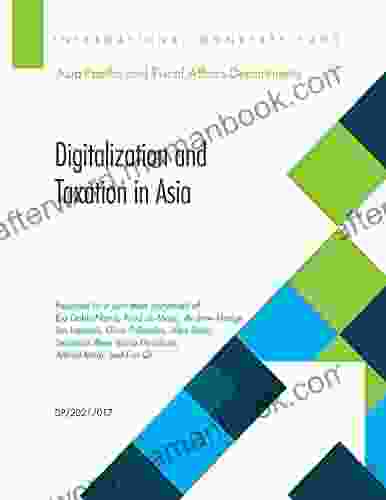Taxing the Digital Economy in Asia: A Path to Equitable Growth and Sustainable Development in a Digitalizing Region

The digital economy has emerged as a transformative force in Asia, driving economic growth, innovation, and connectivity. However, the rapid growth of digital businesses has also raised complex challenges for tax authorities in the region. This paper examines the multifaceted issues surrounding the taxation of the digital economy in Asia, exploring the region's unique characteristics, identifying challenges and opportunities, and suggesting policy approaches to ensure fair and effective taxation.
The digital economy encompasses a wide range of activities, including e-commerce, digital services (such as online streaming, ride-hailing, and cloud computing),and digital platforms. Asia is home to some of the world's largest and fastest-growing digital economies, with countries like China, India, and Indonesia leading the way. The region's large population, increasing smartphone penetration, and growing internet connectivity have fueled the growth of digital businesses.
However, the digital economy also poses unique challenges for tax authorities. Digital businesses often operate across borders, making it difficult to determine where taxable income should be attributed. They may also use complex corporate structures and transfer pricing mechanisms to minimize their tax liability. Additionally, the intangible nature of digital products and services can make it challenging to value them for tax purposes.
4.5 out of 5
| Language | : | English |
| File size | : | 2437 KB |
| Text-to-Speech | : | Enabled |
| Enhanced typesetting | : | Enabled |
| Word Wise | : | Enabled |
| Print length | : | 110 pages |
| Screen Reader | : | Supported |
The challenges of taxing the digital economy are compounded by the diversity of Asia's tax systems. While some countries have made progress in modernizing their tax laws to better address the digital economy, others are still grappling with the issue. The lack of harmonization across jurisdictions can lead to double taxation, tax avoidance, and tax evasion.
Despite the challenges, taxing the digital economy also presents opportunities for revenue generation and promoting sustainable development in Asia. By capturing tax revenues from digital businesses, governments can invest in public services, infrastructure, and education, which are essential for inclusive growth and poverty reduction.
To effectively tax the digital economy, Asian countries need to adopt a comprehensive and coordinated approach. This includes:
- Updating tax laws and regulations: Revising tax laws to address the specific challenges of taxing digital businesses, including rules on business presence, income attribution, and transfer pricing.
- Implementing digital tax reforms: Introducing new taxes or modifying existing ones to target digital activities, such as digital services taxes or value-added taxes on online transactions.
- Enhancing tax administration and compliance: Improving tax administration capabilities to identify, assess, and collect taxes from digital businesses, including the use of technology and data analytics.
- Promoting international cooperation: Collaborating with other countries to develop harmonized tax rules, exchange information, and prevent tax avoidance and evasion.
Several Asian countries have taken steps to address the taxation of the digital economy.
- China: Implemented a digital services tax in 2021, targeting non-resident businesses that provide digital services to Chinese consumers.
- India: Introduced a digital tax equalisation levy in 2016, which applies to certain digital services provided by non-resident businesses to Indian consumers.
- Singapore: Implemented a Goods and Services Tax (GST) in 2017, which includes a provision for digital services.
- Japan: Revised its tax laws in 2021 to introduce a new withholding tax on digital advertising revenue earned by non-resident businesses.
These case studies provide valuable insights into the different approaches that Asian countries are taking to tax the digital economy.
Taxing the digital economy in Asia is a complex and evolving issue. However, it is essential to address the challenges and seize the opportunities presented by the digital economy to ensure fair and effective taxation while promoting inclusive growth and sustainable development in the region. By adopting comprehensive and coordinated policy approaches, Asian countries can harness the potential of the digital economy to drive economic prosperity and social progress.
Policymakers, tax administrators, and stakeholders across Asia should engage in a collaborative dialogue to develop effective and equitable solutions for taxing the digital economy. By sharing experiences, best practices, and research, we can create a tax system that fosters innovation, promotes sustainable development, and benefits all citizens.
4.5 out of 5
| Language | : | English |
| File size | : | 2437 KB |
| Text-to-Speech | : | Enabled |
| Enhanced typesetting | : | Enabled |
| Word Wise | : | Enabled |
| Print length | : | 110 pages |
| Screen Reader | : | Supported |
Do you want to contribute by writing guest posts on this blog?
Please contact us and send us a resume of previous articles that you have written.
 Top Book
Top Book Novel
Novel Fiction
Fiction Nonfiction
Nonfiction Literature
Literature Paperback
Paperback Hardcover
Hardcover E-book
E-book Audiobook
Audiobook Bestseller
Bestseller Classic
Classic Mystery
Mystery Thriller
Thriller Romance
Romance Fantasy
Fantasy Science Fiction
Science Fiction Biography
Biography Memoir
Memoir Autobiography
Autobiography Poetry
Poetry Drama
Drama Historical Fiction
Historical Fiction Self-help
Self-help Young Adult
Young Adult Childrens Books
Childrens Books Graphic Novel
Graphic Novel Anthology
Anthology Series
Series Encyclopedia
Encyclopedia Reference
Reference Guidebook
Guidebook Textbook
Textbook Workbook
Workbook Journal
Journal Diary
Diary Manuscript
Manuscript Folio
Folio Pulp Fiction
Pulp Fiction Short Stories
Short Stories Fairy Tales
Fairy Tales Fables
Fables Mythology
Mythology Philosophy
Philosophy Religion
Religion Spirituality
Spirituality Essays
Essays Critique
Critique Commentary
Commentary Glossary
Glossary Bibliography
Bibliography Index
Index Table of Contents
Table of Contents Preface
Preface Introduction
Introduction Foreword
Foreword Afterword
Afterword Appendices
Appendices Annotations
Annotations Footnotes
Footnotes Epilogue
Epilogue Prologue
Prologue M A Rothman
M A Rothman Madison Kim
Madison Kim Nancy L Silk
Nancy L Silk Michel Dorais
Michel Dorais Steven Lovink
Steven Lovink L Q Murphy
L Q Murphy Lynn Johnson
Lynn Johnson Clifford Malloy
Clifford Malloy Jill Winger
Jill Winger William Martin
William Martin C L Bragg
C L Bragg Stephen Peace
Stephen Peace Olivie Blake
Olivie Blake Maggie Weldon
Maggie Weldon Jameel Haiat
Jameel Haiat Lene Andersen
Lene Andersen Ben Mezrich
Ben Mezrich Jessica Seinfeld
Jessica Seinfeld Susan Perry Gurganus
Susan Perry Gurganus Bailey Booth
Bailey Booth
Light bulbAdvertise smarter! Our strategic ad space ensures maximum exposure. Reserve your spot today!

 Shannon SimmonsThe Sports Boys and Other Stories: A Literary Journey into the Heart of...
Shannon SimmonsThe Sports Boys and Other Stories: A Literary Journey into the Heart of... Gavin MitchellFollow ·5.3k
Gavin MitchellFollow ·5.3k Gary CoxFollow ·15.2k
Gary CoxFollow ·15.2k Joe SimmonsFollow ·14.3k
Joe SimmonsFollow ·14.3k Cason CoxFollow ·13.8k
Cason CoxFollow ·13.8k Gabriel HayesFollow ·15.2k
Gabriel HayesFollow ·15.2k Ralph Waldo EmersonFollow ·13.5k
Ralph Waldo EmersonFollow ·13.5k VoltaireFollow ·16.1k
VoltaireFollow ·16.1k Jamie BlairFollow ·6.1k
Jamie BlairFollow ·6.1k

 Bryce Foster
Bryce FosterViolin Is Easy: A Comprehensive Guide for Beginners
The violin is a...

 Cristian Cox
Cristian CoxThe True Story Of The Ivy League Cowboys Who Raided The...
In the early 2000s, a group of Ivy League...

 Ken Follett
Ken FollettUnraveling the Enchanting World of Menewood: A...
Embark on an enthralling...

 Phil Foster
Phil FosterNorth Poems by Seamus Heaney: An Exploration of Place,...
Seamus Heaney's North...

 Jack Butler
Jack ButlerFleeting Encounters: The Enigmatic Transience of Maria...
In the annals of literary history, fleeting...

 Eliot Foster
Eliot FosterA Haiku Summer: Capturing the Essence of the Season in...
Summer is a time of warmth,...
4.5 out of 5
| Language | : | English |
| File size | : | 2437 KB |
| Text-to-Speech | : | Enabled |
| Enhanced typesetting | : | Enabled |
| Word Wise | : | Enabled |
| Print length | : | 110 pages |
| Screen Reader | : | Supported |










